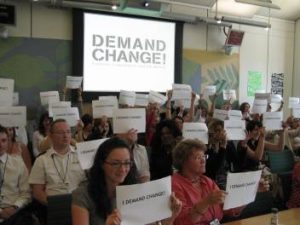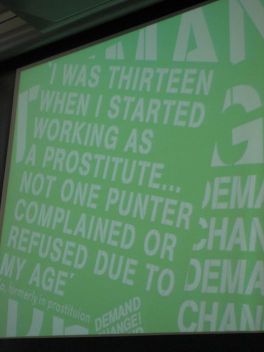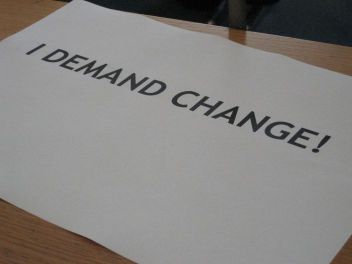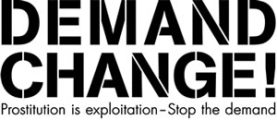The Campaign
Who?
Demand Change! was a joint campaign between Eaves and OBJECT. Read more about us here
What?
Demand Change! calls on the Government to fulfil its multiple international and domestic obligations to tackle demand for prostitution. Section 14 of the Policing and Crime Act 2009 which criminalises the buying of sex from a person who has been subjected to force or coercion is a welcome step towards holding those who purchase sexual acts accountable for their actions.


Why?
Prostitution is not glamorous or harmless. It is commercial sexual exploitation which – whilst affecting some men and boys – is profoundly gendered and is defined by the United Nations as an act of violence against women (1). It is both a cause and consequence of wider systems of gender inequality and human rights violations. Treating women merely as sexual objects through commercial sexual exploitation rather than as individuals contributes to attitudes underpinning gender-based discrimination and violence. This makes prostitution a key social justice issue.
- Council of Europe’s Convention on Action against Trafficking in Human Beings (2005)
- Universal Declaration of Human Rights (1948)
- UN Slavery Convention (1926)
- Supplementary Convention on the Abolition of Slavery, the Slave Trade and Institutions and Practices Similar to Slavery (1956)
- European Convention of Human Rights (1950)
- International Convention on Civil and Political Rights (1966)
- UN Working Group on Contemporary Forms of Slavery (est. 1975)
- UN Declaration on the Elimination of Violence against Women (1994)
- UN Fourth Conference on Women (Platform for Action) (1995)
- UN Convention against Transnational Organised Crime and its Protocol to Prevent, Suppress and Punish Trafficking in Persons, Especially Women and Children (Palermo Protocol) (1998)
- Convention on the Elimination of All Forms of Discrimination Against Women (1971) and the Optional Protocol to the Convention (1999)
- European Union Council Framework Decision on Combating Trafficking in Human Beings (2002).
Section 14 of the Policing and Crime Act (2009) represents the first time in UK history that the criminal gaze has shifted away from people exploited in prostitution to focus on those who directly contribute to this exploitation by choosing to buy women, girls, boys and men for sexual use, ensuring that buyers take responsibility for their exploitative actions.
This legislation signifies a historic victory for the Demand Change! campaign, survivors of the sex industry, Parliamentarians, unions and activists across the country who lobbied hard for Section 14 to places the right of vulnerable people in prostitution to live free from commercial sexual exploitation above any perceived ‘right’ of buyers to pay for sexual acts. This is an important step towards gender equality and social justice. However more can be done.

(1) As defined in the United Nations Declaration on the Elimination of Violence against Women.
